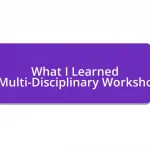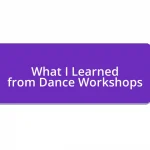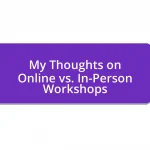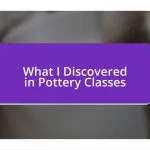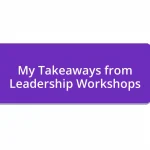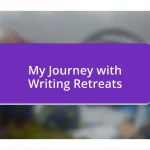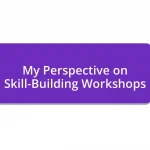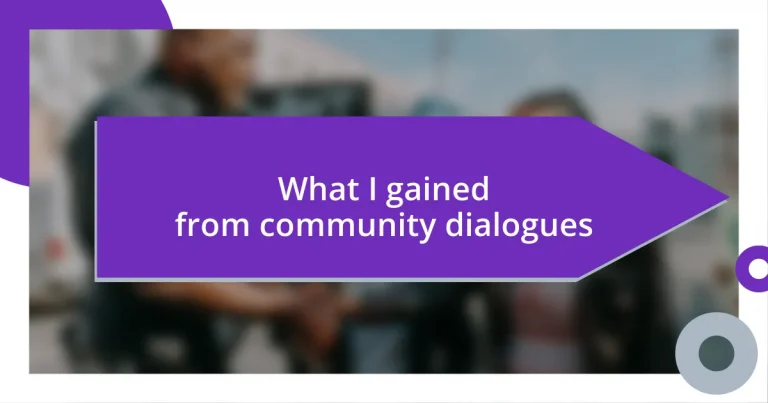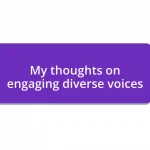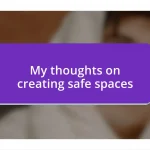Key takeaways:
- Community dialogues foster trust and deep connections by encouraging individuals to share personal stories and listen actively to one another.
- Participating in these dialogues enhances communication skills, empathy, and a sense of belonging within the community.
- Effective collaboration arises from focusing on shared goals and creating safe spaces for diverse voices, leading to impactful community initiatives.
- Insights gained from community dialogues can be applied in everyday interactions, promoting a greater sense of collective impact and empowerment in community involvement.
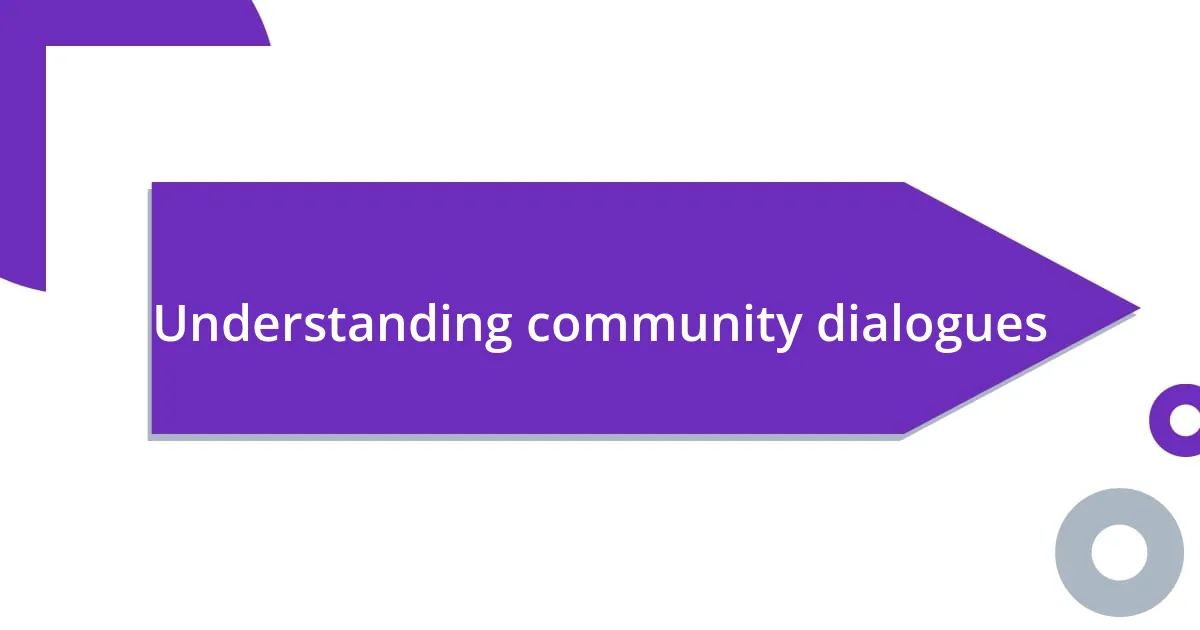
Understanding community dialogues
Community dialogues are spaces where people come together to share their experiences, beliefs, and concerns. I vividly remember attending a neighborhood gathering where diverse voices were not just heard, but valued. It made me realize how impactful it can be when individuals openly express their stories—each person brings a unique perspective that enriches the conversation. Have you ever felt that rush of connection when someone shares a story that resonates with your own?
These dialogues often foster a sense of trust within the community. In my experience, participating in one discussion led to a deeper understanding of a neighbor’s challenges, which in turn ignited a genuine desire to help. It struck me that listening can be just as powerful as speaking; the simple act of giving someone the floor can shift dynamics in ways that we often overlook. Isn’t it fascinating how a single conversation can pave the way for lasting relationships?
As I reflect on these exchanges, I realize that community dialogues are not about finding quick solutions, but rather about building bridges. They encourage us to confront difficult topics collaboratively, creating a space where discomfort can lead to growth. I often wonder, hasn’t every truly meaningful change in our world started with a respectful dialogue? That’s the beauty of it—these conversations can spark ideas that amplify the collective voice of a community.
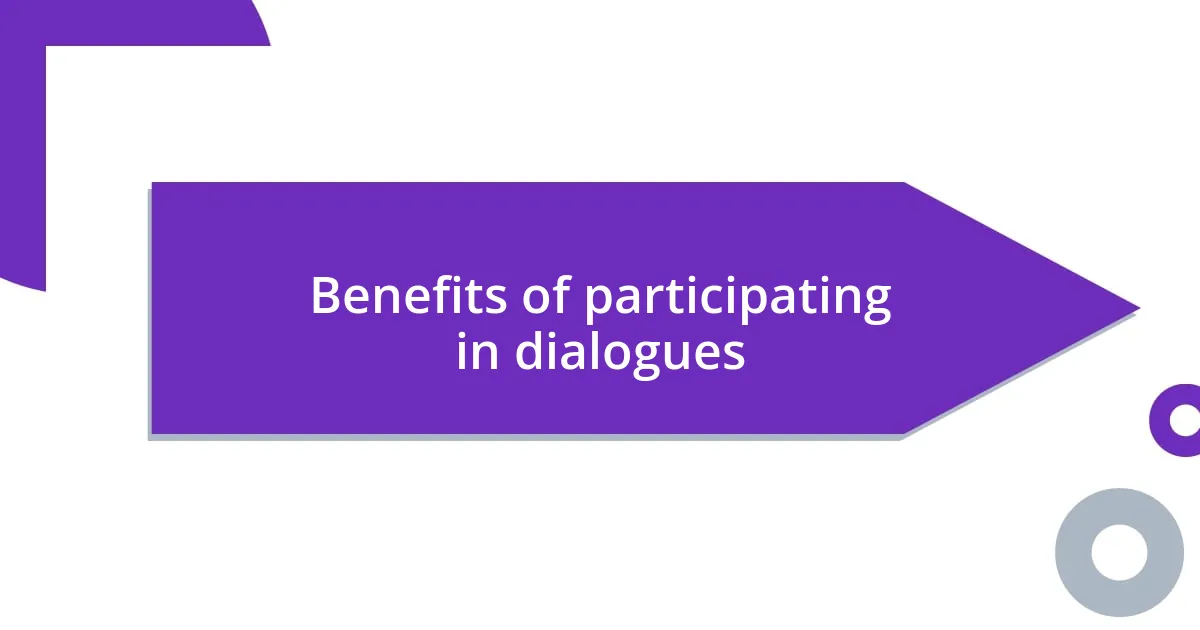
Benefits of participating in dialogues
Participating in community dialogues has provided me with invaluable insights that extend far beyond just sharing thoughts. I remember my first dialogue session; the atmosphere was filled with tentative voices, but as we exchanged stories, the energy shifted. It felt like lifting a weight off our shoulders, and I gained not only new perspectives but also a profound sense of empathy. Each story shared was a thread, weaving a stronger fabric of understanding among us.
Benefits of participating in dialogues include:
- Enhanced Communication Skills: I noticed my ability to articulate thoughts improved drastically, as I learned to express complex feelings in simple terms.
- Increased Empathy: Understanding others’ viewpoints made me more compassionate, leading me to reassess my own beliefs and biases.
- Stronger Community Bonds: I left each dialogue feeling a renewed sense of belonging. Knowing I wasn’t alone in my experiences created an unspoken connection.
- Diverse Perspectives: Hearing varied opinions challenged my own thinking. I often walked away questioning my assumptions in a productive way.
- Empowerment: Engaging with others gave me the confidence to speak out on issues that mattered to me, as I realized my voice held value.
The emotional rewards carried through into my everyday interactions; I found myself more open and willing to engage with those around me. It was a reminder that every dialogue is an opportunity to grow, not just as individuals but as a community unified in our shared experiences.
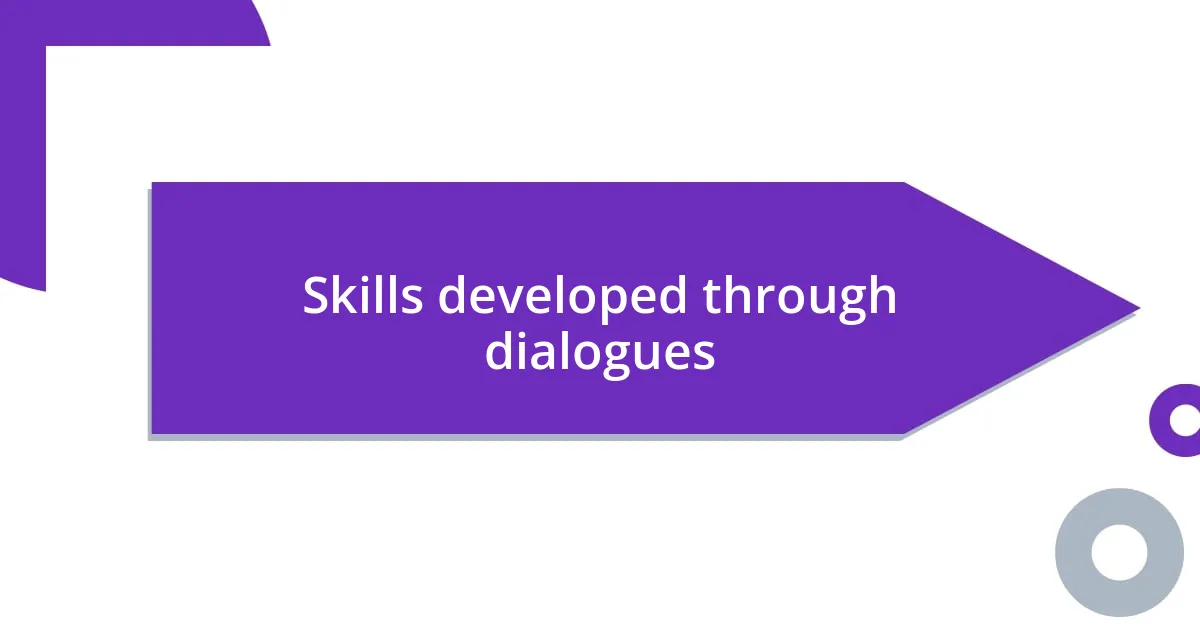
Skills developed through dialogues
Participating in community dialogues has been a transformative experience for me, especially in terms of developing essential skills. One of the most significant skills I honed was active listening. In one memorable session, I found myself captivated by a fellow participant recounting their struggles with isolation. As I focused entirely on their words, I discovered a profound depth of understanding that went beyond my initial perceptions. The act of truly listening opened up a new layer of connection that I hadn’t anticipated.
Moreover, my ability to ask thoughtful questions grew remarkably. I remember a dialogue where someone shared a personal challenge; instead of jumping in with my own story, I felt compelled to ask questions that encouraged deeper discussion. This practice not only enriched the conversation but also taught me how to foster an environment where others feel safe sharing their truths. Don’t you think the right question can be more powerful than a well-structured argument?
Finally, I realized that facilitation skills can be developed through these dialogues. There was a time when I led a small group discussion, and although I felt nervous at first, I learned to guide the conversation while being both authoritative and approachable. The experience was exhilarating, as I could see my peers engaging constructively with one another. This newfound skill helped me recognize the importance of nurturing dialogue, rather than dominating it.
| Skill | Description |
|---|---|
| Active Listening | Deepens understanding by fully focusing on others’ words. |
| Thoughtful Questioning | Encourages deeper dialogue and understanding. |
| Facilitation | Guides conversations constructively and empathetically. |
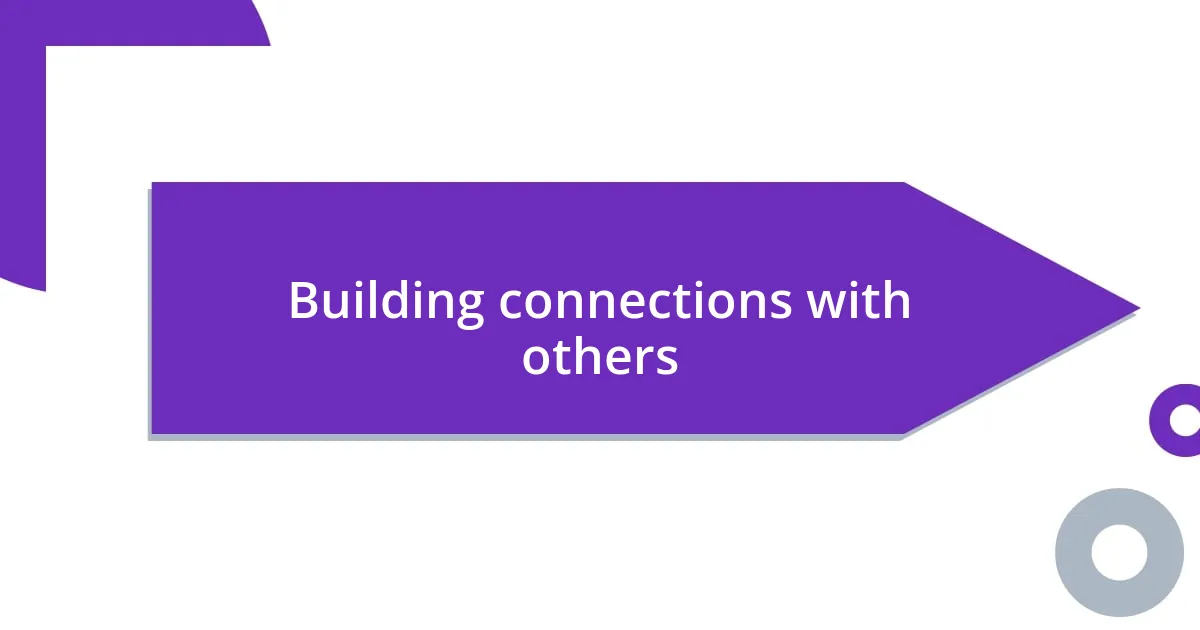
Building connections with others
Building connections with others became one of the most rewarding aspects of participating in community dialogues. I vividly recall a moment when a participant shared a deeply personal story about their family’s struggles. As I listened, I felt a tug on my heartstrings; it was as if their experience mirrored some of my own. That moment of recognition created an instant bond, which made me realize how sharing vulnerabilities can foster genuine connections among people who might otherwise remain strangers.
In another dialogue, I engaged with a participant whose views challenged my own. At first, I felt defensive, but then I reminded myself to approach the conversation with curiosity rather than judgment. I asked, “How did you arrive at that perspective?” Their thoughtful explanation opened a window into their experiences, and I found myself nodding in agreement on several points. These moments illustrate that building connections often requires a willingness to step back and explore the experiences of others, even when they differ from our own.
Reflecting on these experiences, I realized that every dialogue was an opportunity to find common ground, even in our differences. Each story shared was like a brushstroke on a canvas, painting a larger picture of our community. Isn’t it fascinating how we can feel so isolated at times, yet one meaningful conversation can remind us that we share more in common than we often acknowledge? This realization transformed not only my relationships but also my understanding of what it means to truly connect with another person.
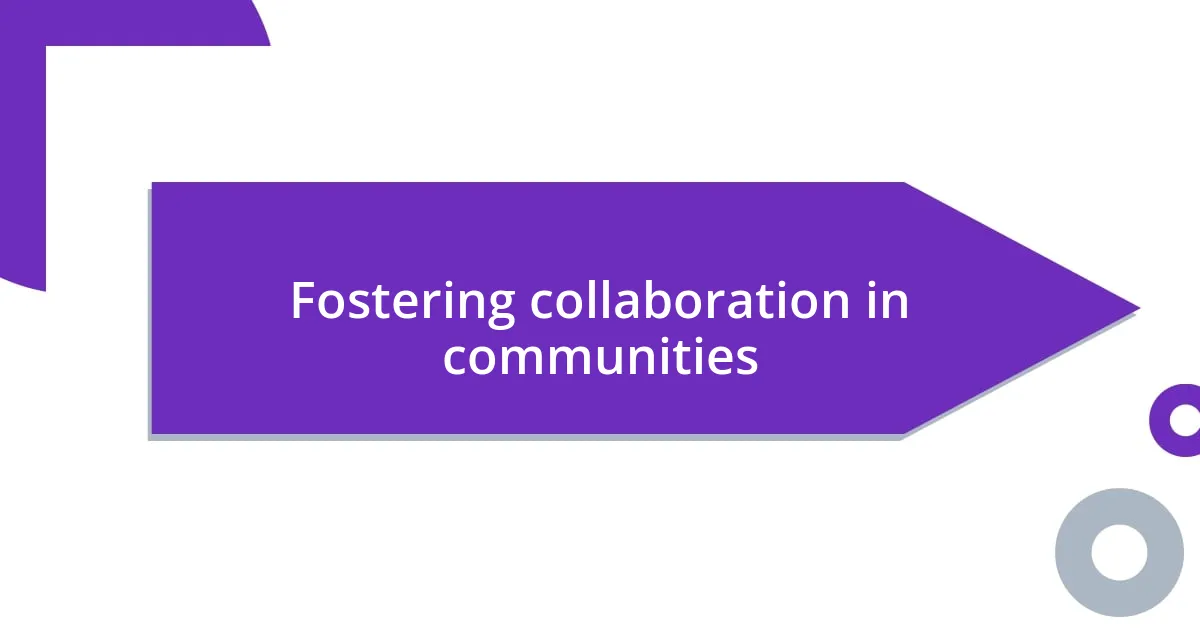
Fostering collaboration in communities
Community dialogues have a unique way of bringing people together, often sparking creative collaborations that I never thought possible. I still remember a session where local artists and city planners discussed how to revitalize public spaces. The energy in the room was palpable as ideas bounced back and forth. It was amazing to see how a simple conversation could lead to plans for community murals and art installations that benefited everyone. Have you ever felt that sense of unity when different perspectives align?
As I participated in these dialogues, I recognized the delicate balance needed when fostering collaboration. One evening, amidst a heated discussion about environmental concerns, I witnessed how emotions ran high. Instead of escalating tensions, I encouraged participants to focus on shared goals—preserving our community’s natural beauty. It amazed me how redirecting the conversation to common interests created a collaborative atmosphere, allowing varied voices to contribute meaningfully. Isn’t it incredible how shifting our focus can open doors to collaboration?
Fostering collaboration goes beyond just dialogue; it thrives on creating an inviting space for all voices to be heard. I recall a dialogue where we engaged in a group activity to map out community needs. Each of us brought our unique insights, and watching the map evolve was exhilarating. The realization that we each had a piece of the puzzle made me appreciate collaboration in a whole new light. It truly highlighted the idea that when we come together, we can achieve so much more than we could individually. Isn’t it fascinating how communities can flourish when collaboration takes center stage?
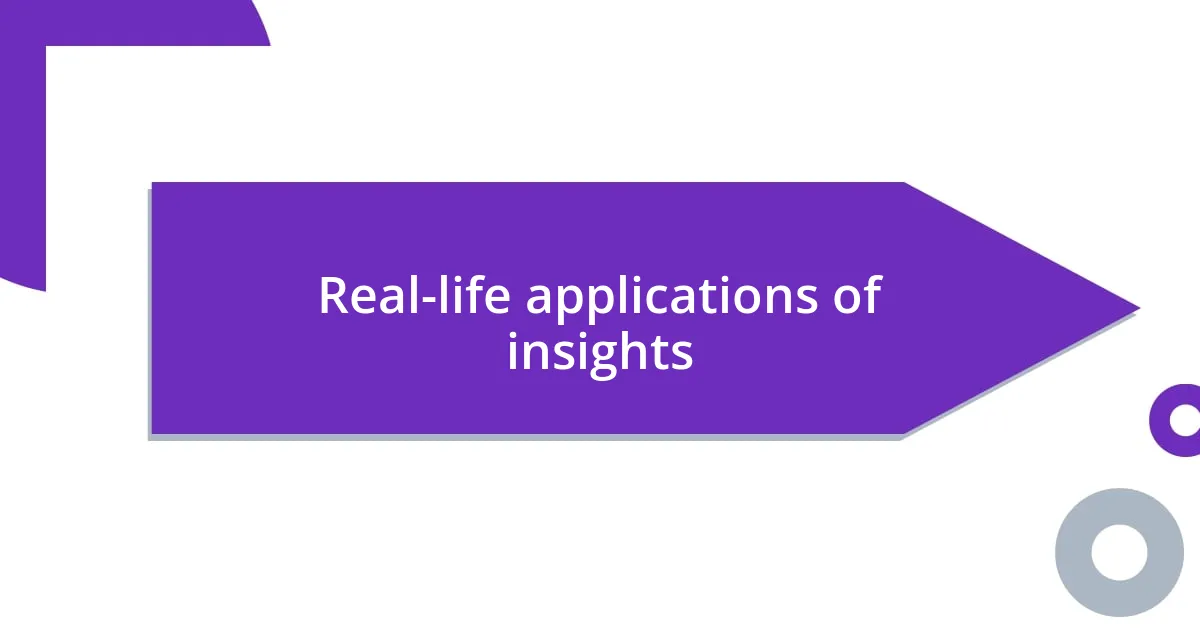
Real-life applications of insights
In applying the insights gained from community dialogues, I found that the lessons extended far beyond just conversations; they influenced my daily interactions. After one enlightening session, I decided to implement the practice of active listening at work. There was a moment when a colleague shared their frustrations about a project, and instead of jumping in with solutions, I asked questions to probe deeper. That simple shift not only diffused the tension but also strengthened our professional relationship. Have you ever tried to just listen without immediately wanting to respond? It’s a powerful tool.
Another instance came in a neighborhood meeting focused on safety improvements. I had an idea about installing better street lighting, but I hesitated to share it, fearing it might seem too simplistic. However, inspired by a fellow participant’s willingness to voice a similar concern, I shared my thought. To my surprise, a passionate discussion unfolded, resulting in a unified proposal for a series of community-led initiatives. It made me realize that no idea is too small if it resonates with others—how liberating is it when we let go of our doubts and contribute?
Reflecting on these experiences, I see how the insights from dialogues have shaped my approach to community involvement. Each interaction has challenged me to think bigger about collective impact. For instance, in a follow-up project concerning local education, I noticed that when we combine personal stories with action plans, the potential for change amplifies dramatically. Isn’t it exciting to think about how sharing our experiences can energize those around us to act? Embracing these insights has not only expanded my perspective but has also empowered me to cultivate change in ways I never anticipated.
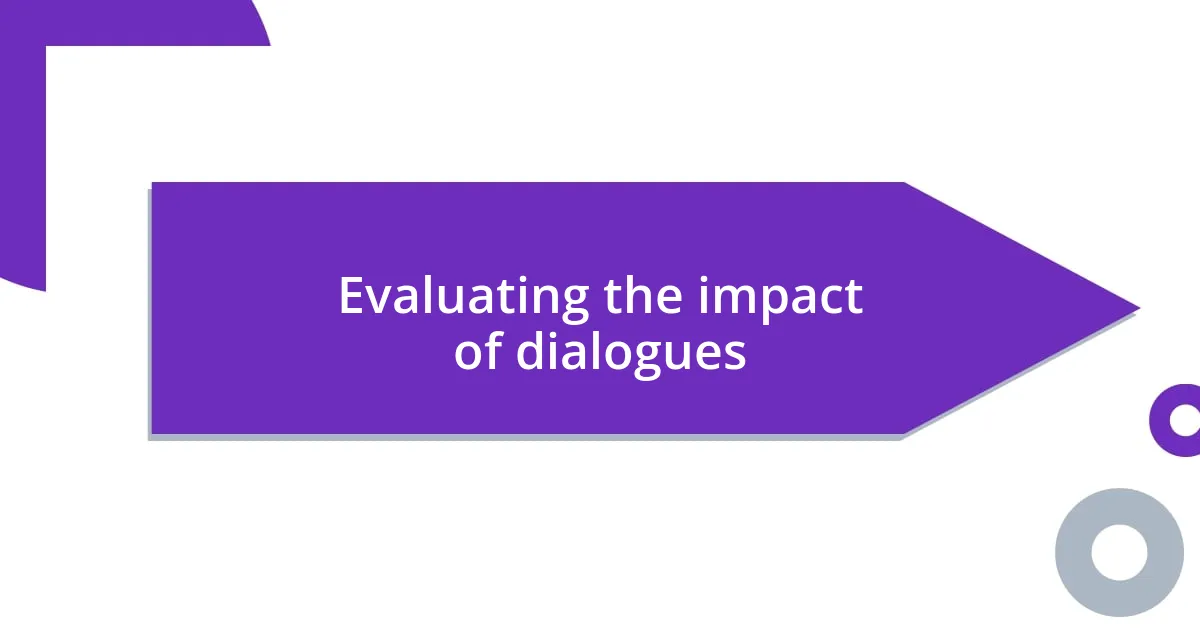
Evaluating the impact of dialogues
Evaluating the impact of dialogues is crucial to understanding their true value in fostering community connections. During one session focused on neighborhood improvements, I could feel how the atmosphere shifted when participants began to share their personal stories. I saw firsthand how these narratives broke down barriers, allowing us to genuinely comprehend each other’s perspectives. Have you ever experienced a moment where someone’s story shifted your understanding of a situation entirely?
Another enlightening instance involved a dialogue centered on local health initiatives. By analyzing our conversations over several weeks, I noticed a tangible increase in community engagement. Residents who were once hesitant about participating began to attend meetings regularly. This enthusiastic involvement was a direct result of recognizing that our voices mattered. Isn’t it empowering to realize that our dialogues can ignite passion and inspire action?
As I delved deeper into evaluation methods, I started tracking changes over time, quantitatively and qualitatively. I collected feedback from participants, noting their feelings about the progress made and the relationships built. One striking observation was how discussions led to the formation of new community groups dedicated to various causes, which surprised me. It reinforced the idea that dialogues can serve as catalysts for ongoing initiatives. How remarkable is it that a simple conversation can create such lasting change?
